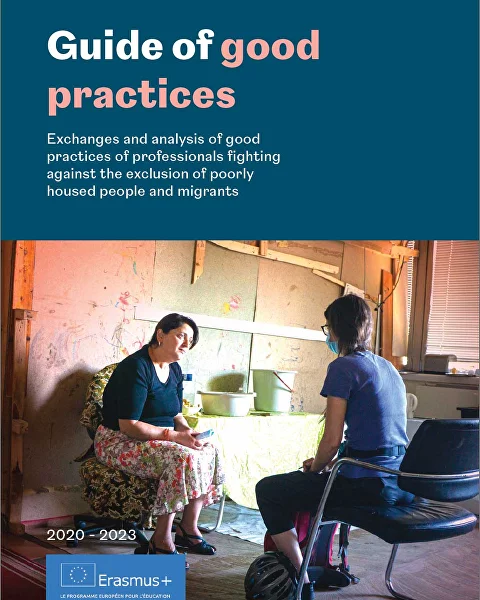
2020—2023
COCAGNE
exchanges and analysis of good practices of professionals
fighting against housing deprivation and exclusion of migrants
COCAGNE Project brings together six European associations from France, Romania, Poland, Italy and Germany working in the fields of migration and asylum, integration, the fight against poor housing and exclusion. Most of these NGO partners offer services to asylum seekers, including assistance with the right to asylum, access to healthcare, housing, employment, and language activities.
The aim of the project is to support the participating NGOs to develop their skills, practices and quality of services, in order to better serve the groups they work with. To this aim, project partners share and discuss practices, assess replication potential and capacity to adopt new work methods based on learning from one another. This exchange will benefit directly the members and teams of the participating NGOs – be them employees, volunteers etc. or various professions: lawyers, town planners, architects, social workers, professional integration officers, language teachers, sociologists, project coordinators, advocacy officers, etc.
Project Overview
The project is implemented within the EU Program Erasmus +. This publication reflects the views only of the author, and the European Commission cannot be held responsible for any use which may be made of the information contained therein.

Monthly online discussions
Exchange/Study Trips to Paris, Berlin, Turin, Resita, Bucharest, Heidelberg, Warsaw, and Lublin
Working on Best Practice Guide including an analysis of a common European law on asylum and access to rights, and biographies of refugees
Project activities
Habitat-Cité, France
Habitat-Cité was created in 2003 by people from diverse backgrounds – urban planning, geography, architecture, photography – with the ambition of contributing to the resorption of slums and any type of unworthy habitat in France and around the world.
To carry out this mission, the founding members of Habitat-Cité felt that it was necessary to act both on the construction and rehabilitation of housing and on the economic and social aspects of exclusion.
Cooperativa Orso, Italy
Orso is a social cooperative born in 1987 from the experience of the GiOC Association – Youth Christian Workers with the aim of building a more just and supportive society, based on the primary value of the person, sustainable development and active citizenship.
It operates on the territory of the Piedmont Region, mainly in the Provinces of Asti, Cuneo and Turin with the aim of promoting equal access to labor market for marginalized groups and full citizenship of people in society.
Rule of Law Institute, Poland
The Rule of Law Institute Foundation is a non-governmental organization created by a group of Polish and American lawyers connected to the Faculty of Law of the Catholic University of Lublin. The Institute was established in 2001. It promotes legal awareness in the society, continuing professional development of lawyers, promotion of the knowledge of the European law and of the idea of European integration, human rights protection, as well as legal representation and advice services to asylum seekers.
The Asylum Working Group Heidelberg eV, Germany
Asylarbeitskreis Heidelberg e.V. has been founded in 1995 upon the first „wave" of refugees from former Yugoslavia to Germany.
The organisation activity is largely based on volunteer members, – 142 people at present – having just one employee financed by the city of Heidelberg.
It is dedicated to supporting refugees in Heidelberg in all aspects of their new life – language translating company to different places, learning language skills, dealing with administrations, free time, law advise, integration into the job market etc.
Make Better Association (MKBT), Romania
MKBT is an interdisciplinary association reuniting professionals from the urban planning, social science and urban engineering working on urban regeneration issues. We have primarily worked so far in demographically shrinking communities, impacted by outmigration and economic restructuring. Housing deprivation of marginalized groups is one of the key areas of work of our NGO. We have implemented housing advocacy initiatives in support of enabling legal environment for those living in informal settlements and are an active member of the Housing Coalition in Romania.




